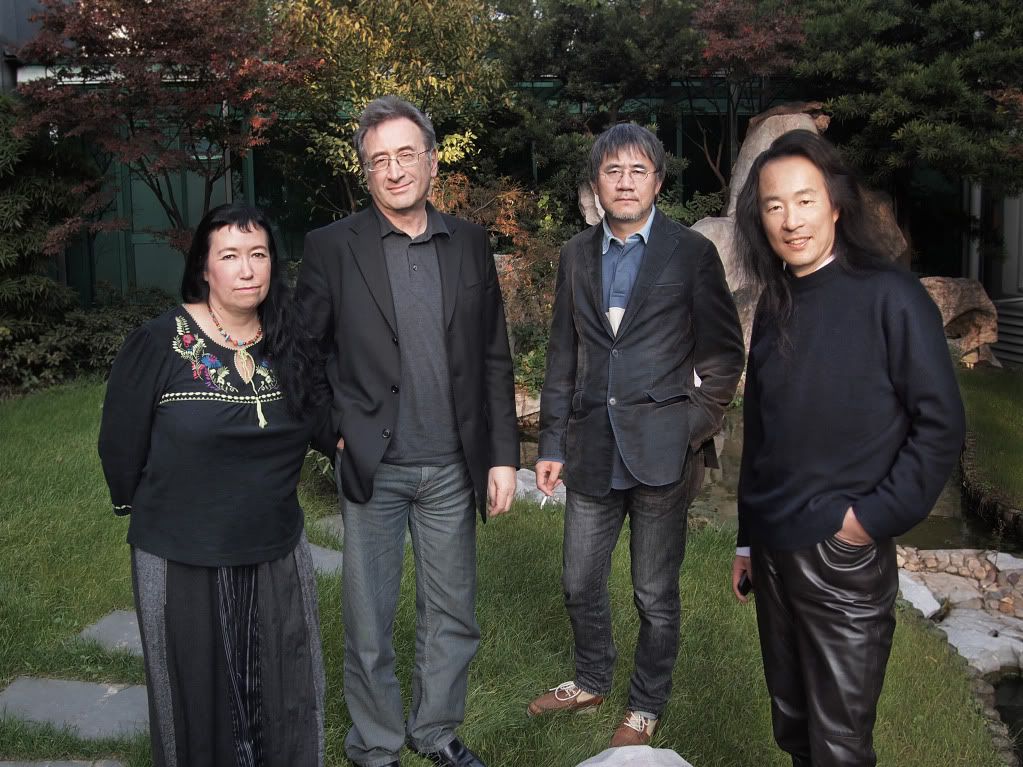
Pascale Petit, myself, Xiao Kaiyu and Yang Lian, November / December 2011
Pascale and I knew each other a little, I had met Lian a couple of times, Kaiyu was an entirely new acquaintance. He was the one who came out to Pudong Airport for C and I in a taxi when no-one else was around. We talked hesitatingly at first, he uncertain of his English, I uncertain how much he understood or wanted to speak. He sat in the front of the taxi, we were at the back. But I immediately warmed to him: something about his manner, quiet, reticent, but genuine. He took us to the hotel then, once we had settled in came to take us out to an artist friend's studio.
Extract from Notes:
We strive to lie down and sleep, having been awake for something like nineteen out of twenty-two hours with only a four hour sleep preceding. C manages, I don't. And soon we are downstairs with Kaiyu again, and he takes us for a very late (Chinese time 3:15 pm) lunch which turns out to be five times as large as we can eat, but then he gets us a taxi and we roar off into the very north of the city to visit the studio of his artist friend, Chen Qiang. The studio, part of a disused factory, is enormous. Qiang's work is abstract, beautiful, patient, crowded, full of small specific marks in apparent motion.
Though he speaks no English, Kaiyu's has improved a lot and he acts as interpreter for us. Qiang introduces to other artist friends in equally enormous neighbouring studios. They all work with various aspects of abstraction on a large scale. In fact the Shanghai School is primarily an abstract movement, very well known and very highly valued in China and abroad. We tour the studios, greatly impressed and determined to argue for a Shanghai School exhibition back in England.
Then Qiang drives us to a nearby restaurant where an absolutely enormous meal is ordered (by him, he is treating us), every part rather exquisite, but still impossible. The conversation moves around art and poetry and the changes in Shanghai.
Kaiyu remembers he had arranged for us to meet the head of the Shakespeare Research Institute at Fudan, Professor Tan Zheng. So Qiang drives us miles and miles back to the hotel from whence he goes home. Kaiyu, Tan Zheng, C and I adjourn for coffee in a nearb coffee place popular with international students. Talk here of Shakespeare and Wilde and influence, and history plays, and religion in China, including the growing Christian influence.
Cheng Qiang, seen here with one of his paintings:

We had no idea how successful and well-known he was, successful that is to say, in an almost Damien Hirst sense. And this is the first surprising thing about Shanghai: the art market. Who buys the works? The state? Big business? The international market? All of them.
The aesthetic: how specifically Chinese is it? How international? Those small ornate regular marks may be a version of calligraphy, a display of patience, an ornamental system or a kind of poetry. How thorough! How big! How meticulous! An art of candied brilliance. Qiang gives us two handsome catalogues as we leave, studies of his work. I see that Kaiyu has written one of the essays.
And the meal. Culinary opulence in a brightly lit modern street, in a restaurant not entirely geared to elegance. Much smoking. A small hole in the tablecloth. But friendly and likeable. One could hang out here: it's not too grand. It's just right.
More photos, videos and music to come, as well as excerpts from the Notes and reflections on them.

No comments:
Post a Comment